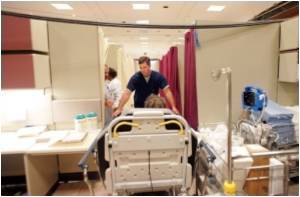
The incoming vital signs and data in the medical record will be continually scrutinized by a machine-learning algorithm looking for signs of clinical deterioration. If any such signs are found, the system will call a nurse on a cell phone, alerting the nurse to check on the patient.
The idea is to create a virtual intensive care unit (ICU) where the patients aren't wired to beeping machines and instead are free to move about as they please, say Chenyang Lu, PhD, a computer scientist at Washington University in St. Louis who was the principal investigator for the prototype-network trial.
The performance of the prototype network, which was installed at Barnes-Jewish Hospital from June 4, 2009, until Jan. 31, 2010, was described at the SenSys '10 conference in Zurich, Switzerland. The feasibility study of the clinical warning system now under way at the hospital will be presented at the American Medical Informatics Association Annual Symposium this October.
The clinical warning system is part of a burgeoning new field variously called body sensor networks or wireless health that will change the future of medicine, Lu says.
Testbed in computer science departmentThe computer scientists thoroughly debugged the software and hardware for the warning system before the prototype was installed in the hospital.
Advertisement









